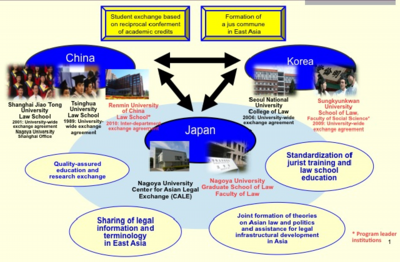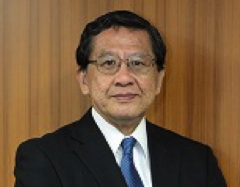Project objectives and philosophy
Basic concept
Jus commune (common law)
The ongoing process of globalization, which is not confined to the economic sphere, is calling for unification or harmonization of underlying legal systems. In Europe, the formation of a jus commune is already in progress beyond the realm of civil and commercial law, giving birth to the European Convention on Human Rights, the EU Directive on Sale of Consumer Goods and Guarantees and so on. The calls for East Asia to also follow this trend are becoming increasingly louder.
However, it is necessary to question the presumed universality of law and human rights and examine whether a certain measure of regionalism should be retained in this domain. Given the actual major differences in social realities, cultures and traditional laws between the East and West, as argued in the 1990s and onward by proponents of the Asian concept of human rights which draws a line from the Western concept, the possibility of an Asian concept of law, including an Asian way of dealing with human rights protection, merits serious study.
Kanji-using cultural zone
In the process of such studies, one should not overlook the important fact that China, Japan and Korea constitute a unique East Asian cultural zone in which ideograms of Chinese origin (kanji) are used. In adopting the Western legal system following the Meiji Restoration, Japan developed a legal terminology using kanji, which later greatly influenced similar enterprises by China and Korea. Naturally, there are many legal terms that are represented by identical ideograms but have different meanings in each of the three countries today, as a result of their respective historical background or subsequent development. Nevertheless, it is possible to envisage harmonization of the legal terminology of the three countries with the aid of a common legal database that can be built with the most advanced information technology, which in turn can accelerate the formation of a jus commune in East Asia.
Assistance for legal infrastructural development
Japan and Korea have been actively providing assistance for legal infrastructural development in neighboring Asian countries that have been shifting to a new political system, such as Vietnam, Cambodia, Mongolia and Uzbekistan. Recently, China has joined this circle of collaboration. To ensure successful assistance for legal infrastructural development in those countries in transition, a deep understanding of their existing laws and legal cultures is essential. In this regard, in-depth joint studies by Japanese, Korean and Chinese researchers on the past and present developments of the law and politics of Asian countries are highly significant, and the transmission of their research achievements to future generations will be of great importance not only for the three countries but for Asia as a whole.
Envisaged human resources
All the enterprises described above require a long period of time to come to fruition and refuse overnight solutions. It is therefore imperative that the necessary human resources be developed in various forms, including continued mutual student exchange among the three countries.
Accordingly, this Project concerns mainly undergraduate-level joint education in the Law and Social Science faculties of participating universities in Japan, Korea and China, to train future jurists, researchers, public servants (in international organizations or of national or regional government) and businesspersons capable of conducting professional activities in the three countries or the Asian region at large.
Program Features
In the Program, the partner universities in Japan, China and Korea exchange undergraduate students who aspire to a global career as a civil servant (of an international organization or national or regional government) or businesspersons who work in or across the three countries.
The Program will put the participating students in contact with businesses and governmental organizations operating in the three countries to enhance the students' future employability.
(1) Triangle Exchange Program
Ten students are sent from the Faculty of Law, Nagoya University to partner universities in China and Korea (five students each) for each academic year, while the Faculty of Law, Nagoya University accepts five students each from China and Korea for each academic year.
The exchange students study at their host universities for a period of one year as a rule. During this period, they pursue the prescribed Core Curriculum and attend courses offered at the host universities (language of instruction: English or the local language).
(2) Core Curriculum
The Core Curriculum comprises (1) introductory courses in the Law and Political Science of each host country, (2) courses in Comparative Law and Political Science that cover the whole world and are designed to build students' academic foundation in Social Science from an international perspective.
In preparation for their participation in the Program, prospective exchange students follow a curriculum with focus on the political and legal systems of their own countries and foreign language skills.
(3) Educational Quality Assurance
The quality of education offered in the framework of this Program will be inspected in terms of content, course requirements, credit acquisition and so on by the Quality Assurance Council, comprised of members representing the participating universities, in order to maintain a high level of program quality.
"Re-Inventing Japan" Project
(Campus Asia)
The "Re-Inventing Japan" Project is a Ministry of Education, Culture, Sports, Science and Technology project, whose objective is to build networks of higher educational institutions in Asia and America, thereby empowering Japanese universities in terms of their global expansion. The Project is characterized by its focus on quality assurance and construction of international frameworks that develop human resources capable of professional activities on a global scale. The Project has thus far mainly assisted strategic acceptance of foreign students by Japanese universities and collaborative educational activities by Japanese and foreign students in Japan.
Nagoya University's "Campus Asia" Program, adopted as a participating program in this Project, is officially defined as a "program for formation of a consortium for exchange programs among Japanese, Chinese and Korean universities with a unified system of mutual conferment of academic credits, grades and academic degrees." In academic year 2011, "Campus Asia" was among ten programs selected to be part of the "Re-Inventing Japan" Project out of 51 candidate programs entered from across Japan. "Campus Asia" is almost the only program concerning the discipline of Law.
Japan Society for the Promotion of Science (JSPS) "Re-Inventing Japan" Project
Ministry of Education, Culture, Sports, Science and Technology "Re-Inventing Japan" Project



